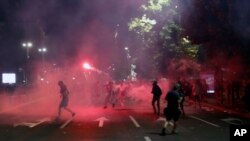Serbian police said Saturday they arrested 71 people after violence erupted in Belgrade late Friday during a fourth night of anti-government protests triggered by another coronavirus lockdown.
The head of Serbian Police, Vladimir Rebic, said 14 riot police were injured as they tried to protect the parliament building with tear gas in downtown Belgrade from hundreds of right-wing protesters who tried to storm the building with rocks, bottles and flares.
The protests over President Aleksandar Vucic’s handling of the coronavirus pandemic evolved during the course of the week into anti-government demonstrations attended by thousands of people.
The first demonstration took place Tuesday after Vucic re-imposed a weekend curfew to contain a second eruption of coronavirus infections that has overwhelmed hospitals in Belgrade.
Critics say the new surge in infections is the result of the government’s decision to relax some lockdown measures in May and to allow parliamentary elections to be held on June 21, which Vucic’s Serbian Progressive Party largely won.
While Vucic later reversed his lockdown, the protests continued and turned into a general rebuke of his management of the coronavirus crisis.
Vucic dismissed his critics’ claims and accused his political opponents of planning the protests.
“The perpetrators will be defeated, the majority of them will be arrested, and they will have to answer for all the crimes they committed,” Vucic said in a live television broadcast from Paris, where is engaged in normalization talks with Kosovo along with French President Emmanuel Macron and German Chancellor Angela Merkel.
Police said 130 officers have been injured since the protests began on Tuesday but did not say how many protesters have been hurt.
Vucic noted that Friday was the most difficult day for the country since the coronavirus outbreak began in December. Eighteen people died of the disease in Serbia in a 24-hour period, according to data published Friday.
The coronavirus has infected more than 18,000 people in Serbia and claimed more than 380 lives, according to data compiled by Johns Hopkins University.





